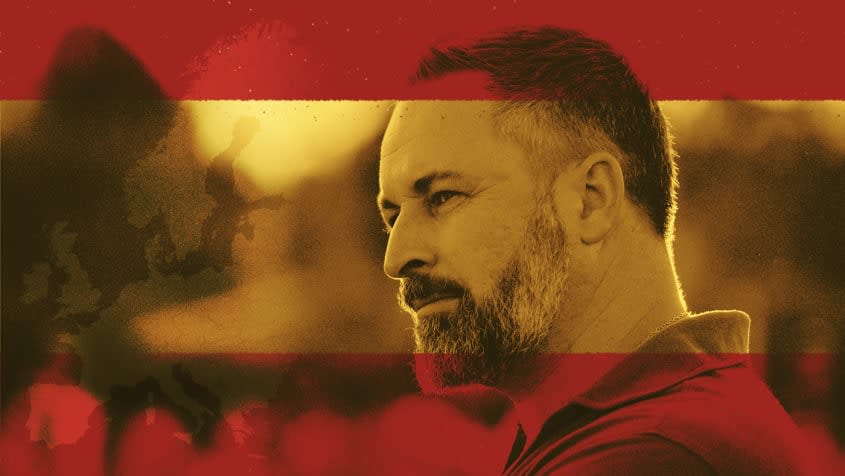What does Vox's rise mean for Europe?

Nearly 50 years after the death of General Francisco Franco, the nationalist right might be on the verge of once again taking power in Spain. The center-right Popular Party seems likely to emerge from this Sunday's elections with the most votes, The Associated Press reported — but probably will need support from the "populist right" Vox Party to form a governing coalition. Vox "opposes abortion rights, denies climate change and rejects the need for government to combat gender violence."
The success of Vox would continue Europe's drift to the right, The Wall Street Journal reported. Across the continent, "stridently nationalist parties considered fringe just a few years ago are moving to the center stage." The parties appeal to voters angry about immigration, the economy and a vast array of societal changes — and they're increasingly becoming normalized. "Once you have a government in place like Meloni's [in Italy], people no longer smell sulfur when they see you," said one Vox strategist.
Vox has already gained a foothold in Spain's cities, The New York Times reported, partnering with the Popular Party in 25 cities of more than 30,000 residents. Vox was formed just a decade ago, and its rapid ascendance has "come as a shock" in Spain, where nationalists have been "sidelined" since Franco's 40-year dictatorship ended in 1975. What does Vox's rise mean for Spain — and for Europe?
What are the commentators saying?
Europe's far-right "isn't so fringe anymore," Pankaj Mishra wrote for Bloomberg. Right-wing parties on the continent once "prospered by stoking hatred of immigration and Islam" — now they've added voters angry that their governments "are asking them to sacrifice too much" to ameliorate climate change. The result? Marginal parties in Germany and Austria are on the rise while right-wing governments in Hungary and Poland are now entrenched. Spain's "elections offer a test case for the health of democracy, not to mention the good sense of voters."
Vox's platform "involves explicitly anti-gay and anti-feminist attacks," former U.K. prime minister Gordon Brown wrote for The Guardian, and it has attempted to stamp out autonomy movements for Catalonia and the Basque region. But those culture war efforts can obscure its economic policies, "which require privatization of utilities, the expansion of private health and top-rate tax cuts." If the party takes power, Spain's "political taboo against neofascist parties in power" will be broken "creating a political earthquake" that will shake the continent.
Spain will be fine, Omar G. Encarnación wrote for the New York Times. "Vox's bombastic rhetoric and toxic policies pose a serious threat to Spanish democracy — but not as existential a threat as many presume it to be." Vox's partnership with the Popular Party could "normalize" Vox, and in any case, it will be a junior partner in the coalition. "Spanish democracy is strong enough to withstand the involvement of a far-right party in a conservative government."
What's next?
The rights of LGBTQ people hang in the balance, NBC News reported. Authorities in one Vox-led town have banned the display of rainbow flags on government buildings, and the Vox-Popular Party coalition has promised to amend a "self-determination" law that lets Spanish citizens change their legal gender by informing a government registry. "It would not only mean bringing a setback in rights — we would also have practically no chances of moving forward," said one nonbinary activist.
Catalan residents also fear Vox's rise, Al Jazeera reported. In the Vox-controlled town of Burriana, authorities recently canceled the library's subscriptions to Catalan-language magazines. That's just one sign of what's to come: "Vox's electoral manifesto proposes – via a referendum – banning all pro-independence political parties across the country, from Catalonia to the Basque Country and Galicia." That could either harm the independence movements or provide them with "fresh fuel."
"The outcome of the election is too close to call," José Ignacio Torreblanca wrote for the European Council on Foreign Relations. Spain currently holds the presidency of the Council of the European Union, but the election results shouldn't have too big an impact on EU activities. And if Vox does become part of the governing coalition, the Popular Party "would likely keep it away from foreign and EU policy." Spanish voters will decide on Sunday.
You may also like
Florida construction and agricultural workforces diminished after new immigration law takes effect
Judge limits how Biden officials can communicate with social media companies
How solar and wind energy are saving Texans from a record heatwave

